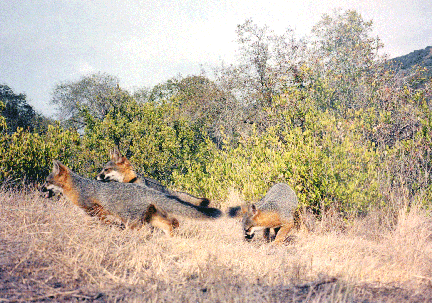
Report Date:
http://www.dfg.ca.gov/
The California Department of Fish and Wildlife (CDFW) has recently seen an increased number of confirmed and suspect cases of canine distemper virus (CDV) in wild gray foxes in the Mount Shasta and Scott Valley areas in Siskiyou County.
Most of California’s carnivore species are susceptible to CDV, with gray foxes, skunks and other mustelids also being highly susceptible. CDV is not transmissible to humans.
CDV is transmitted among carnivores by contact with oral, respiratory and ocular fluids and other body fluids (feces and urine) containing the virus. Animals with the virus may not show clinical signs but can still spread the virus for up to 90 days. Although infections in domestic dogs have been reduced through vaccination, infected dogs that have contact with or share food with wild carnivores can transmit the virus to wildlife. The virus also spreads among wild carnivores and mostly affects susceptible young animals. Distemper can cause respiratory, neurologic and gastrointestinal illness in foxes. Clinical signs include, but are not limited to, depression, fever, respiratory distress, diarrhea, anorexia, incoordination, moving in small circles, yellow to clear discharge from the nose and eyes, and crusting on the nose, eyes, mouth or footpads. There is no treatment for sick animals except supportive care. Infected gray foxes may or may not survive the illness.
If you find a sick or injured fox:
If you are bitten or scratched by a fox:
If you find a dead fox:
CDFW encourages the public to remove domestic pet food from outside their home (especially at night), and to not feed wildlife or allow them contact with domestic animals. Domestic dogs and cats should receive vaccinations for rabies, distemper and other common diseases as directed by a veterinarian.
For questions regarding distemper in wildlife or concerns about sick animals, contact CDFW’s Wildlife Investigations Laboratory at (916) 358-2790 or CDFW Wildlife Biologist Christine Found-Jackson at (530) 841-2278.
Report Date:
Question: I want to take my 16-year-old son fishing and I know there are piers where neither of us need......
Report Date:
Various Days — Guided Wetland Tours, By Reservation, at Gray Lodge Wildlife Area, 3207 Rutherford Road, Gridley (95948). A wildlife naturalist will......